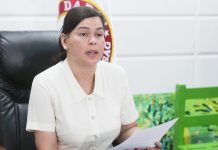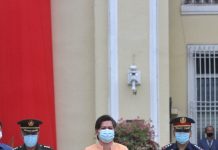by Loire Ann A. Cascaro
“Daang matuwid. Labanan ang korapsyon.” (Straight path. Fight corruption.)
These were the famous electoral campaign slogans of candidate, now President Benigno Aquino III.
But, an independent research-education-information development institution in the country since 1978, IBON Foundation, Inc., finds these as “deliberate rhetoric.”
“Parang sa telenobela, inaaliw lang tayo (Like in the television drama, we are only being entertained),” Mandy Felicia, head of people’s education and resource center of IBON said during the Birdtalk last August 25 at the Brokenshire College, Madapo Hills, Davao City.
The IBON Birdtalk is a semi-annual forum on economic and political assessments and trends. It represents alternative information on the current economic and political situation as well as analysis from the people’s point of view.
According to Felicia, Aquino’s corruption rhetoric is a cover up of the major and fundamental issues of the Filipinos such as joblessness, hunger and poverty. The president, he said, only aims to curtail small time corrupt people who are in the middle bureaucracy.
“He has no statement on the fundamental changes of the needs of the basic masses,” Felicia said.
Joblessness
In its midyear briefing, IBON states that based on the revised definition of unemployment, as of April 2010, the Philippines has around 4.62 million unemployed. However, the true unemployment rate has reached 11.5 percent as of April 2010, and the number of jobless people increased by 7.7 percent from only a year ago.
“There are currently 6.30 million underemployed Filipinos, which bring the total number of job-starved Filipinos to around 10.92 million, an increase of 1.37 million since Arroyo came to power.
This figure even understates the gravity of the employment situation since 16.1 million (46%) of the 35.4 million employed are own-account and unpaid family workers in the informal sector. Available jobs are thus of low quality, insecure, low-paying, and without workers’ benefits.”
It says that 13 million of the total employed in April 2010 were part-time workers or worked for less than 40 hours during the reference week. Meanwhile, 1.89 million of the total underemployed worked for 40 hours or more still wanted additional work.
The data were provided by the Income and Employment Statistics Division, Household Statistics Department and the National Statistics Office.
In the region, unemployment rate remains at six percent while underemployment reached 22.8 in January this year based on the National Statistics and Coordination Board (NSCB) 11.
Mainly because of the lack of jobs here, 3,890 Filipinos leave the country everyday according to statistics. Based on the Philippine Overseas Employment Administration (POEA) report, there were 1,422,586 deployed overseas Filipino workers (OFW) in 2009.
POEA Davao City had deployed 912 OFWs in January to April this year, which is 20.27 percent of their 4,500 annual targets. This is based on its accomplishment report for April 2010.
Hungry and poor Filipinos
Although the 2009 Family Income and Expenditure Survey (FIES) will be released in October 2010, the increasing number of poor population has already been felt. There were 27.6 million poor people based on 2006 FIES, thus there was an increase by 16 percent since 2003.
“The 2006 FIES concluded that poverty worsened from 24 poor families out of 100 in 2003 to 27 poor families out of 100 in 2006.”
In Davao region, poverty incidence also increased from 28.5 percent in 2003 to 30.6 percent in 2006, based on the data from the National Statistics and Coordination Board region 11.
“An urban-rural differentiation of the official poverty statistics also shows that 14 out of 100 urban dwellers and 45 out of 100 rural people were poor in 2006. Rural areas account for some 75 percent of Philippine poverty,” IBON says.
The National Wages and Productivity Commission reported that as of June 2010, the daily minimum wage was P404.00, but the real minimum wage was only P242.35. This means there was only P4.93 increase in real wage.
Rising prices of commodities
IBON collated the data of increases in prices from the National Food Authority, Manila Electric Company, Metropolitan Waterworks and Sewerage System, and Department of Energy.
Rice prices increased since 2008 from P25 to P34 for well milled, P23 to P31 for raw milled and P18 to P25 for NFA.
Electricity rates increased since 2001 by 50 percent for residential, 29 for commercial and 20 for industrial.
In Davao City, the Davao Light Power Corporation recently announced the increase of electricity fee by P0.08 per kilowatt hour starting in August. However, according to KADAMAY, an urban poor organization, as they computed their bills, the increase was actually P0.3311/kw.
Speaking for KADAMAY Davao, Franchie Buhayan said that based on her August bill, the kilowatt per hour increased to P1.570 from P1.2409 in the previous month.
“Skyrocketing prices of basic commodities, exorbitant user-fees, and overpriced fuel products have aggravated the country’s poverty situation. After food, the three items that typically occupy family spending are: house rental; transportation and communication; and fuel, light and water.”
“The challenge for the Aquino administration is to reverse these policies and start instituting economic democracy,” IBON states.






